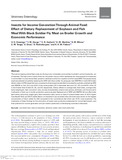| dc.description.abstract | The ever-increasing animal feed costs are driving many vulnerable communities involved in animal husbandry out of business. The high cost is mainly driven by the protein source, which represents the most expensive component in animal feed. In conventional feed, protein is obtained mainly from soybean and fish meal (SFM). The present study explored potential of partially replacing this SFM with black soldier fly prepupae meal (BSFPM) in Cobb 500 broiler chicken diets. A SFM-based diet was compared to three experimental diets formulated by partially substituting SFM with BSFPM at 13.8, 27.4, and 42.0% of the crude protein (CP) in the starter feed and 11.0, 37.2, and 55.5% of the CP in the finisher feed of diets D1, D2, and D3, respectively. Dietary effects on average daily feed intake, average daily body weight gain, feed conversion ratio, carcass characteristics, breast meat sensory attributes, and the economic implication of their use in broiler production were evaluated. Replacement of SFM with BSFPM did not affect daily feed intake, daily body weight gain, feed conversion ratio, aroma or taste of cooked breast meat. A 16.0% higher Cost Benefit Ratio and 25.0% better Return on Investment was recorded when the birds were reared on the highest concentration of black soldier fly (D3) compared to the conventional diet which was 19.0% more expensive. The implication of these findings for the promotion of insect mass production enterprises for animal feed protein, and their potential for income generation and job creation particularly in developing countries is discussed. | en_US |



